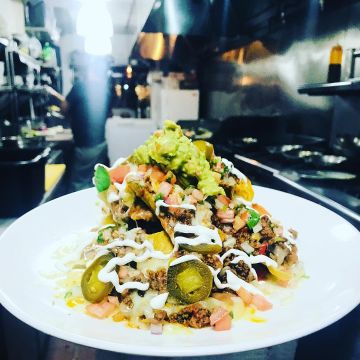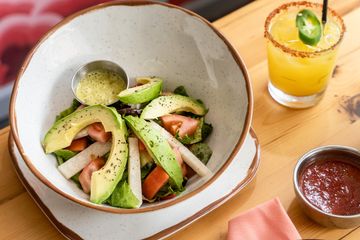Find out how best mexican westchester NY delivers unmatched dining experiences
Is Mexican Food Healthy? Unloading the Nutritional Conveniences of Conventional Ingredients
The concern of whether Mexican food is healthy and balanced invites an exploration of its conventional active ingredients. Beans and corn offer as fundamental staples, abundant in protein and fiber. Avocados supply beneficial fats, while numerous natural herbs and flavors add taste and wellness advantages - tacos. Together, these components create a tapestry of nutrition. The healthiness of Mexican food often depends on preparation approaches and portion dimensions. What role do these variables play in identifying its overall dietary value?
The Power of Beans: Healthy Protein and Fiber-Rich Staples
Although typically overlooked, beans offer as a cornerstone of Mexican cuisine, supplying a wide range of dietary advantages. Rich in protein, they are an excellent plant-based choice for those seeking to satisfy their dietary healthy protein requires. This high healthy protein material sustains muscular tissue fixing and growth, making beans invaluable for both vegetarians and meat-eaters alike. Furthermore, beans are an exceptional source of nutritional fiber, which helps in digestion and advertises a feeling of fullness, potentially aiding with weight management.
The range of beans made use of in Mexican recipes, such as black beans, pinto beans, and kidney beans, adds to a varied taste account and can boost meals nutritionally. Beans are low in fat and consist of vital vitamins and minerals, including folate, magnesium, and iron. Together, these attributes make beans an essential component, providing both nutrients and nourishment in conventional Mexican fare.

Corn: a Versatile Grain With Nutritional Conveniences
Corn stands out as a versatile grain fundamental to Mexican cuisine, celebrated not just for its cooking applications yet also for its excellent nutritional profile. As a main component in meals like tortillas, tamales, and pozole, corn provides essential nutrients that contribute to a well balanced diet regimen. Rich in carbohydrates, it functions as a significant power resource, while additionally being low in fat, making it a desirable option for numerous nutritional needs.
Corn is a good source of dietary fiber, which aids in food digestion and advertises satiation. It has significant quantities of vitamins such as B-complex vitamins, which are essential for basal metabolism. The presence of anti-oxidants, especially carotenoids, adds to overall health by reducing oxidative tension. Additionally, corn is gluten-free, satisfying those with gluten sensitivities. Overall, the nutritional benefits of corn highlight its significance in traditional Mexican food and its role in a healthy and balanced diet plan.
Avocados: Healthy And Balanced Fats and Nutrients in Every Bite
Avocados play a considerable function in Mexican cuisine, complementing dishes with their luscious structure and rich taste. Beyond their cooking allure, avocados are celebrated for their excellent dietary account. They are a rich resource of healthy monounsaturated fats, which can help reduced negative cholesterol degrees and support heart wellness. Additionally, avocados are loaded with crucial vitamins and minerals, consisting of potassium, vitamin E, and B vitamins, adding to general wellness.
The high fiber material in avocados help digestion and advertises satiety, making them an advantageous addition to any type of meal. Their one-of-a-kind nutrient composition can additionally support skin wellness and provide anti-inflammatory benefits. Integrating avocados into standard Mexican recipes or enjoying them as a standalone treat can improve both taste and nutrition, demonstrating why they are a precious staple in Mexican food. Generally, avocados use a tasty means to take pleasure in healthy fats and crucial nutrients in every bite.

Herbs and flavors: Flavorful Wellness Boosters
While taking pleasure in the abundant flavors of Mexican cuisine, one can not neglect the necessary role that spices and herbs play in boosting both preference and health. Active ingredients such as oregano, chili, and cilantro peppers not only contribute to the vivid taste account however additionally supply substantial health and wellness advantages. Cilantro is understood for its detoxifying homes, assisting to get rid of hefty metals from the body, while oregano is packed with anti-oxidants and has anti-inflammatory effects.
Chili peppers, a staple in many Mexican recipes, consist of capsaicin, which has actually been connected to boosted metabolic rate and pain alleviation. Furthermore, seasonings like cumin original site and coriander assistance digestion and may aid in blood glucose guideline. Incorporating these tasty health and wellness boosters right into meals not just boosts the cooking experience however also promotes overall health, making Mexican food not just delicious, but additionally nutritionally beneficial.
Standard Cooking Approaches: Enhancing Nourishment and Flavor
Typical food preparation methods in Mexican food play an important role in boosting both nourishment and flavor, as they usually prioritize classic methods and fresh active ingredients. Techniques such as nixtamalization, where corn is soaked and prepared in an alkaline solution, not just improve the nutrient account of tortillas yet likewise boost their digestibility - churros. In addition, the usage of slow cooking approaches, like stewing or braising, permits flavors to fuse beautifully while retaining the honesty of the active ingredients

Frequently Asked Concerns
Are Mexican Food Portions Usually Larger Than Other Cuisines?
Mexican food portions are frequently larger than those of lots of other cuisines. This particular shows conventional dining methods, stressing public sharing and hearty dishes, which can cause an extra significant serving dimension in general.
Just how Does the Preparation Technique Affect Healthiness of Mexican Food?
Preparation methods significantly affect the healthfulness of Mexican food. Strategies such as grilling or steaming maintain nutrients, while frying can raise undesirable fat content. Options of components and cooking styles inevitably establish overall dietary value.
Can Mexican Food Be Customized for Particular Dietary Limitations?
Mexican food can certainly be tailored for particular dietary restrictions. Replacements, such as making use of corn tortillas for gluten-free diets or incorporating more veggies, make it possible for people to appreciate conventional tastes while suiting different dietary demands.
What Are Typical False Impressions About Mexican Food and Health?
Usual mistaken beliefs about Mexican food consist of the idea that it is naturally unhealthy, extremely hot, and only concentrated on fats. In reality, traditional dishes usually feature nourishing ingredients and can be tailored to numerous nutritional needs.
Exist Healthier Options at Mexican Restaurants?
Much healthier choices resource at Mexican restaurants typically consist of barbequed meats, beans, and fresh veggies. Selecting dishes that emphasize entire components and staying clear of heavy sauces can cause a more nutritious dining experience, advertising general well-being.
The range of beans used in Mexican dishes, such as black beans, pinto beans, and kidney beans, contributes to a varied flavor profile and can improve dishes nutritionally. Avocados play a significant duty in Mexican food, matching dishes with their velvety structure and rich taste. Including avocados right into conventional Mexican meals or appreciating them as a standalone snack can improve both flavor and nutrition, showing why they are a beloved staple in Mexican cuisine. While appreciating the abundant flavors of Mexican cuisine, one can not overlook the crucial a fantastic read function that spices and natural herbs play in enhancing both taste and wellness. Traditional food preparation approaches in Mexican food play a necessary role in enhancing both nourishment and flavor, as they often prioritize time-honored techniques and fresh active ingredients.